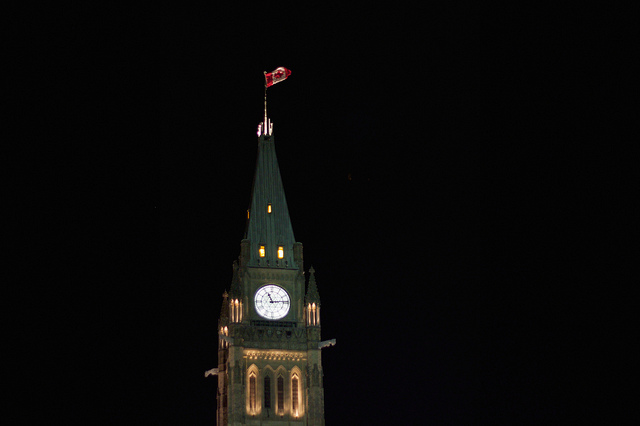Like this article? Chip in to keep stories like these coming.
For the opposition parties, the lack of effective oversight for Canada’s spies and police in the government’s new anti-terrorism legislation is one serious flaw.
It is not the only one, however.
In a CBC Radio interview on Thursday morning, former Conservative Public Safety Minister Stockwell Day tried to claim that the opposition parties have not said what, substantively, they would change in the proposed legislation, Bill C-51.
Day’s interviewer then chimed in: “But they do want increased oversight, why won’t the government do that?”
Day tried to argue that the oversight question was a separate issue, and could be dealt with in subsequent legislation.
But the CBC interviewer failed to challenge the former minister on an important point, namely that all opposition parties would change what they call vague, dangerous and problematic “wording” in Bill C-51.
As we have written in this space over the past two weeks, the “wording” issue is not a minor one. It is not a matter of tinkering with a few details of the Bill and leaving its essence in tact.
The “wording” all opposition parties are talking about includes the vast and dangerously all-inclusive “definition” of what might constitute “activity that undermines the security of Canada.”
The scope of such activity, the Bill says, does not only encompass what most of us would agree is violent and dangerous terrorism. It includes much that looks like legitimate, legal dissent or, at most, non-violent civil disobedience in the Gandhian tradition.
It is important to note that Liberal Leader Justin Trudeau made a point of saying, in the House, that like their NDP colleagues he and his fellow Liberals do not agree with this dangerously broad wording.
Liberal MP and former Justice Minister Irwin Cotler made the same point on CBC’s Cross Country Checkup.
He pointed to provisions in Bill C-51 that would apply the “terrorist” label to “interfering” with critical infrastructure and to activities that undermine the “economic and financial stability of Canada.”
Those provisions, the Liberal MP said, are contrary to basic notions of freedom of expression, and probably to the Canadian Charter of Rights.
Cotler also shares the concerns of the Green Party and the NDP about the new crime the Bill would create of “promoting terrorism in general.”
Currently, it is a crime to promote terrorist acts, not some vaguely defined activity in general.
Now the phrase “terrorism in general” might sound anodyne enough, at first blush.
But opposition parties and other critics argue that it potentially criminalizes people who merely advocate certain kinds of ideas, or even those who share such advocacy on social media, without there being in any way a direct link to actual or potential acts of violence.
Trudeau made his opposition clear in the House
When folks in the media portray Bill C-51 as being, on the whole, acceptable, except for the lack of adequate oversight — and especially when they claim that is the Liberal position — take such a portrayal with a grain of salt.
If you take the time to analyze it, in fact, the Liberal critique of Bill C-51 is almost as comprehensive and thorough as that of the Greens or the NDP.
The big difference between the Liberals and the others is that Trudeau and his MPs, with an excessively obsessive eye to opinion polls, will vote for Bill C-51 despite their significant and grave concerns.



